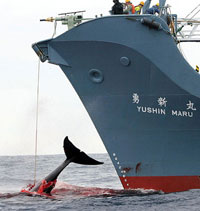
|
|
Japan's whaling fleet is hunting a whale
|
Japan came under a storm of criticism Monday for going ahead with its largest whale hunt yet.
Defying warnings from its Western allies that it would inflame an emotional row on whaling, Japan on Sunday sent its fleet to the Antarctic Ocean. The hunt will include famed humpback whales for the first time.
A ship of Greenpeace environmentalists tried -- so far in vain -- to track down the six-vessel whaling fleet as the United States, Australia, Britain and New Zealand all spoke out against the catch.
Japan, where whale meat is an important part of people’s food, plans to kill 950 whales on the five-month mission using a loophole in a 1986 global moratorium that allows "lethal research" with scientific purpose on the giant mammals.
Australia's opposition Labor Party, which is leading in polls ahead of national elections Saturday, said it would send out the navy to track the Japanese whalers and take video footage if it takes power.
Prime Minister John Howard said while "I totally disagree" with Japanese whaling, he opposed bringing in the military.
The US acknowledged Japan's right to conduct the hunt, but urged it to "refrain" from doing so.
"While recognising Japan's legal right under the whaling convention to conduct this hunt, we note that non-lethal research techniques are available to provide nearly all relevant data on whale populations," State Department spokesman Sean McCormack said.
The environmental group Greenpeace's Esperanza ship was trying to find the fleet but said that the whalers had turned off identification equipment.
"If they're so confident they were doing the right thing, they shouldn't have anything to hide, but obviously they do," Greenpeace activist Dave Walsh said.
Humpback whales, protected under a 1966 worldwide moratorium by International Whaling Commission after years of overhunting, are renowned for their complex songs and acrobatic displays.
點(diǎn)擊查看更多雙語新聞
(Agencies)
|
本周一消息,日本因啟動(dòng)迄今規(guī)模最大的捕鯨行動(dòng)而遭到各方強(qiáng)烈譴責(zé)。
此前,日本的西方盟友向其發(fā)出警告,稱其此次捕鯨行動(dòng)將會(huì)引起國(guó)際社會(huì)的公憤。但日本一意孤行,已于上周日派捕鯨船隊(duì)前往南極海。而且日本此次的捕鯨計(jì)劃首次將珍稀物種座頭鯨納入捕殺名單。
“綠色和平”環(huán)保組織已派船追蹤由六艘船組成的日本捕鯨船隊(duì),但截至目前,還沒有發(fā)現(xiàn)他們的蹤跡。美國(guó)、澳大利亞、英國(guó)和新西蘭均對(duì)日本的捕鯨行動(dòng)表示了抗議。
日本此次捕鯨行動(dòng)將為期五個(gè)月,計(jì)劃捕殺950頭鯨。據(jù)悉,1986年出臺(tái)的《國(guó)際捕鯨禁令》未明文禁止“以科研為目的”的捕鯨活動(dòng)(譯者注:該禁令禁止以商業(yè)為目的的捕鯨活動(dòng)),日本正是鉆了這個(gè)空子。但據(jù)了解,鯨肉一直是日本人餐桌上的美味。
在上周六的大選民調(diào)中領(lǐng)先的澳大利亞在野黨工黨表示,將派海軍追蹤日本的捕鯨船隊(duì),并將拍攝其捕鯨全過程。
澳大利亞總理約翰?霍華德說,他“堅(jiān)決反對(duì)”日本的捕鯨活動(dòng),但不贊成動(dòng)用軍隊(duì)。
美國(guó)承認(rèn)日本有捕鯨的權(quán)利,但并不主張其這樣做。
美國(guó)國(guó)務(wù)院發(fā)言人西恩?馬克考麥克說:“首先得承認(rèn),日本在遵守國(guó)際捕鯨禁令的前提下,開展捕鯨活動(dòng)是合法的,但據(jù)我們了解,通過非致命性的研究手段就可以得到幾乎所有有關(guān)鯨類的相關(guān)數(shù)據(jù)。”
“綠色和平”環(huán)保組織的“埃斯波蘭薩號(hào)”一直在尋找日本的捕鯨船隊(duì),但據(jù)了解,日本的捕鯨船隊(duì)已關(guān)閉其識(shí)別裝置。
“綠色和平”組織的環(huán)保主義人士戴維?沃爾什說:“如果他們相信自己做得對(duì),就不必隱藏什么,但現(xiàn)在看來,他們顯然是在躲藏。”
座頭鯨以會(huì)“唱?jiǎng)勇牭母枨焙捅硌蓦s技而著稱。多年來,座頭鯨被人類過度捕獵,1966年,國(guó)際捕鯨委員會(huì)出臺(tái)捕殺禁令以保護(hù)這一物種。
(英語點(diǎn)津姍姍編輯)
|